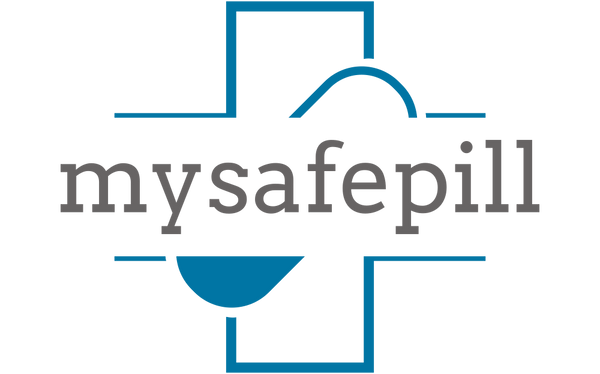Share
MySafePill
Pregabalin 300MG (Nervigesic)
Pregabalin 300MG (Nervigesic)
Couldn't load pickup availability
Product Details
Manufacturer/ Marketer : Signature
Pack Size : (1×15)
Active Ingredient : Nervigesic
Category : Pain Relief
Dosage Form : Tablet/Oral
What is Pregabalin 300mg (Nervigesic) ?
Pregabalin 300mg, sold under various brand names, including "Nervigesic," is a medication used to treat several medical conditions, primarily related to neurological and neuropathic pain. Pregabalin is the active ingredient in this medication, and it belongs to a class of drugs known as anticonvulsants or antiepileptics. It is used to manage many conditions that are :-
- Neuropathic Pain: Pregabalin is commonly prescribed for the management of neuropathic pain, which is pain that arises from damage or dysfunction of the nervous system. This can include conditions like diabetic neuropathy, post-herpetic neuralgia (pain following shingles), and other forms of nerve pain.
- Epilepsy: Pregabalin is also approved for the treatment of partial-onset seizures in epilepsy when used in combination with other antiepileptic medications.
- Generalized Anxiety Disorder (GAD): In some regions, pregabalin is approved for the treatment of generalized anxiety disorder, a condition characterized by excessive and uncontrollable worry and anxiety.
Here are some key points about Pregabalin 300mg (Nervigesic):
- Mechanism of Action: Pregabalin works by binding to calcium channels in the central nervous system, reducing the release of neurotransmitters that are involved in transmitting pain signals. This helps to alleviate pain and may also have a calming effect on nerve activity.
- Dosage: The dosage of Pregabalin can vary depending on the condition being treated and individual factors. For neuropathic pain, the usual starting dose may be 150mg per day, which can be increased as needed and tolerated. For epilepsy, dosages may vary based on the specific treatment plan and response.
- Safety and Precautions: Pregabalin should be used under the guidance of a healthcare provider, and the prescribed dosage should be followed closely. It's important to report any side effects or concerns to your healthcare provider. Pregabalin may cause dizziness, drowsiness, or other side effects that can impair your ability to perform tasks such as driving.
- Dependence and Withdrawal: Pregabalin has the potential for dependence and withdrawal symptoms if used inappropriately or for extended periods. It should not be abruptly discontinued without medical supervision.
- Side Effects: Common side effects of Pregabalin can include dizziness, drowsiness, dry mouth, blurred vision, and weight gain. Less commonly, it may cause swelling in the extremities (peripheral edema) or other side effects.
Side effects of Pregabalin 300mg medicine
Pregabalin 300mg, like any medication, can cause side effects in some individuals. It's important to note that not everyone will experience these side effects, and some people may experience them to a greater degree than others. Common side effects of Pregabalin 300mg may include:
- Dizziness: Dizziness is one of the most common side effects of Pregabalin. It can range from mild to severe and may increase the risk of falls, especially in older adults.
- Drowsiness: Drowsiness or sleepiness is another common side effect, which can impair your ability to perform tasks that require mental alertness, such as driving.
- Dry Mouth: Some individuals may experience dry mouth or xerostomia.
- Blurred Vision: Blurred vision or other visual disturbances can occur.
- Weight Gain: Pregabalin use is associated with weight gain in some individuals.
- Edema (Swelling): Swelling, particularly in the extremities (peripheral edema), may occur.
- Fatigue: Fatigue or tiredness can be a side effect.
- Difficulty Concentrating: Some people may experience difficulty concentrating or memory problems.
- Headache: Headaches can occur as a side effect.
- Gastrointestinal Symptoms: Gastrointestinal side effects, such as nausea, vomiting, or diarrhea, may be experienced by some individuals.
- Mood Changes: Pregabalin can rarely cause mood changes, including irritability, agitation, or anxiety.
- Withdrawal Symptoms: Abrupt discontinuation of Pregabalin can lead to withdrawal symptoms, which may include anxiety, insomnia, nausea, and increased heart rate. It's essential to taper off the medication under medical supervision when discontinuing it.
- Allergic Reactions: Allergic reactions to Pregabalin are rare but can include rash, itching, swelling, severe dizziness, or difficulty breathing. Take immediate medical action if you are experiencing signs of an allergic reaction.
It's important to take Pregabalin 300mg only as prescribed by a healthcare provider and to follow their recommendations regarding the dosage and duration of use. Alcohol should be avoided while taking this medication, as it can intensify the sedative effects and increase the risk of side effects.
If you experience severe or bothersome side effects while taking Pregabalin, or if you have any concerns about the medication, contact your healthcare provider for guidance and potential alternatives.
Dosage
The dosage of Pregabalin 300mg, like any medication, should be determined by a healthcare provider based on the specific medical condition being treated, the individual's response to the medication, and other factors. Pregabalin is available in various strengths, including 300mg capsules or tablets. Here are some general dosage guidelines for Pregabalin:
- Neuropathic Pain (Diabetic Neuropathy, Postherpetic Neuralgia, etc.):
- The usual starting dose is often 150mg per day, taken in two or three divided doses.
- Depending on the individual's response and tolerance, the dosage may be increased to 300mg per day (150mg twice daily or 75mg three times daily).
- Fibromyalgia:
- The typical starting dose for fibromyalgia is 75mg twice daily (150mg total daily dose).
- Some individuals may benefit from an increased dose of 300mg per day (150mg twice daily).
- Generalized Anxiety Disorder (GAD):
- The recommended starting dose for GAD is usually 150mg per day, taken in two or three divided doses.
- The dosage may be increased to 300mg per day (150mg twice daily or 75mg three times daily) based on the individual's response.
- Epilepsy (Adjunctive Therapy):
- For the adjunctive treatment of partial-onset seizures in epilepsy, the typical starting dose is 150mg per day, divided into two or three doses.
- The dose may be increased to 300mg per day (150mg twice daily or 75mg three times daily) based on the individual's response.
It's important to note that Pregabalin should be taken exactly as prescribed by a healthcare provider. The medication may be taken with or without food, but consistency in the timing of doses is recommended to maintain steady levels in the bloodstream.
Additionally, dosage adjustments may be necessary for individuals with impaired kidney function, as Pregabalin is primarily eliminated from the body through the kidneys. Healthcare providers will carefully assess the appropriateness of the dosage for each patient.
Do not adjust the dosage or discontinue Pregabalin without consulting your healthcare provider, as abrupt discontinuation can lead to withdrawal symptoms. If you have any questions or concerns about the dosage or use of Pregabalin, it's essential to discuss them with your healthcare provider to ensure safe and effective treatment.
Precautions while taking Pregabalin 300mg medicine
When taking Pregabalin 300mg or any medication containing pregabalin, it's essential to follow specific precautions to ensure safe and effective treatment. Some important precautions while taking this medicine are :-
- Take as Prescribed: Always take Pregabalin exactly as prescribed by your healthcare provider. Do not change the dose or quit taking the medicine without consulting your doctor.
- Avoid Alcohol: Alcohol can enhance the sedative effects of pregabalin, leading to drowsiness and impaired coordination. Avoid alcohol while taking this medication.
- Pregnancy and Breastfeeding: If you are pregnant or planning to become pregnant, discuss the use of pregabalin with your healthcare provider. This should only be taken during the pregnancy if the potential benefits outweigh the risks. Similarly, if you are breastfeeding, talk to your healthcare provider about the risks and benefits of continuing or discontinuing pregabalin.
- Mood Changes: Some individuals may experience mood changes, including irritability or anxiety, while taking pregabalin. If you notice significant mood changes, inform your healthcare provider.
- Withdrawal: Do not stop taking pregabalin abruptly. If your healthcare provider decides to discontinue the medication, they will provide guidance on how to taper off it gradually to minimize the risk of withdrawal symptoms.
- Allergies: If you are allergic to pregabalin or any of its components, inform your healthcare provider before starting treatment.
- Other Medications: Inform your healthcare provider about all the medications you are currently taking, including prescription drugs, over-the-counter medications, and dietary supplements. Some medications may interact with pregabalin.
- Elderly Population: Elderly individuals may be more sensitive to the side effects of pregabalin, such as dizziness and drowsiness. Caution should be exercised, and lower initial dosages may be recommended.
- Monitoring: Regularly attend follow-up appointments with your healthcare provider to monitor the effectiveness of the medication and assess for any side effects or adverse reactions.
Always consult your healthcare provider if you have questions or concerns about taking pregabalin or if you experience any unusual or severe side effects while on the medication. Following these precautions can help ensure the safe and appropriate use of Pregabalin 300mg or any medication containing pregabalin.
 Reliable
Reliable
 Secure
Secure
 Affordable
Affordable





